The Pakistani wedding experience!
Getting invited along to a wedding in any country is a great way to experience the local culture, but weddings in the subcontinent are a spectacle unto themselves. A Pakistani wedding is an interestingly dynamic mix of Islamic rituals and local, subcontinental customs.
Pakistani weddings tend to happen in the winter months, given the average Pakistani’s aversion to any temperature over 25 degrees centigrade. That means between October and March. Additionally, many people will not get married during the mourning of Muharram and Safar, which is currently falling in October and November, leaving only three to four months of cold weather in which to get hitched.
The Islamic procedure for a wedding is very simple; a nikkah, which is a signed marriage contract between the two parties and their families, witnessed by two people. Pakistan’s weddings typically run for three days, so there’s quite a lot more than just a nikkah to host. The wedding rituals are therefore a selection of subcontinental traditions which might be somewhat familiar to a Hindu audience. Overtly Hindu rituals such as the “seven steps” are not present, but other traditions rooted in local custom such as the “Mehndi” are. Male and female attendees of the wedding may sit separately, divided by a partition (as dictated by Islamic belief), or together, similar to a Western wedding – the choice is the organisers’.
Note; what follows is a description of the standard Punjabi Pakistani Muslim wedding, and there are thousands of variations based on local culture, tradition, faith or caste.
Mehndi (first day)
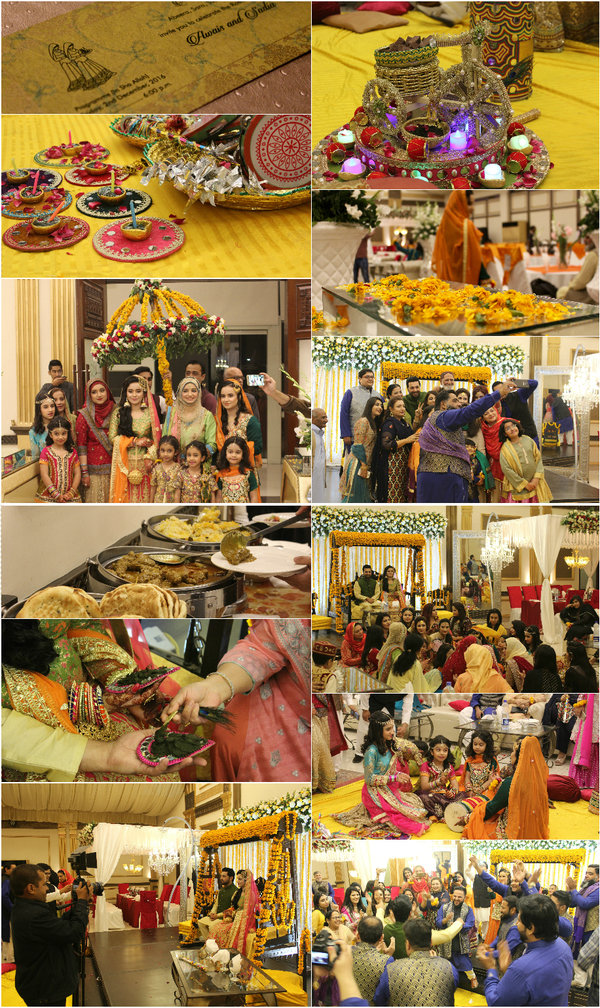
Mehndi is the local word for henna, the dark paste that is used to create temporary tattoo-like patterns on the hands. It’s also the name of the celebration before the marriage, normally the night before the main function. The mehndi is therefore a bit like a Pakistani equivalent of a Western ‘wedding shower’. While it was traditionally hosted by the bride’s family for the bride, this is extended in many cases to include both the groom’s and the bride’s families. The ceremony may be held in a special “wedding hall”, at a hotel function hall, at someone’s home, or occasionally in a hired restaurant.
The predominant colours are yellow and orange, the colour that mehndi turns the skin, and the ceremony basically involves the ceremonial arrival of the groom, followed by the ceremonial arrival of the bride; they both sit on a decorated seat at the front of the room, followed by some dancing and live music, and then the relatives and friends take turns to smear some mehndi paste on a leaf-shaped platters held by the couple. The dress code is (usually) traditional, and mehndi patterns may be applied to the hands of groom and the bride before or during the ceremony. And of course, there’s food – mains plus lots of sweet dishes and tea.
Barat (second day)
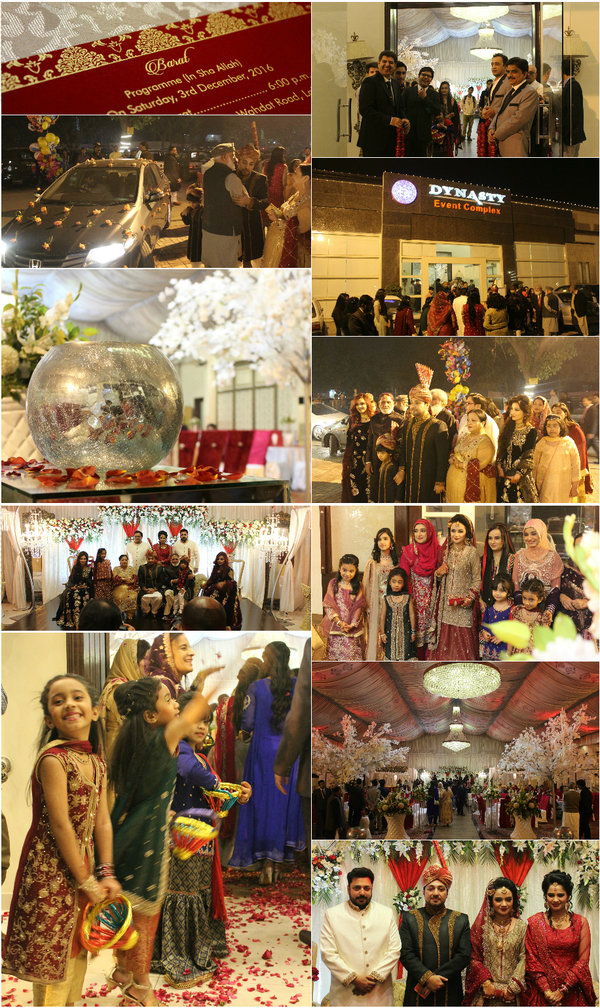
The Baraat (also spelt Barat) is the formal part of the wedding process, in which the groom arrives at the function in a formal procession. Traditionally the groom arrived on the back of a mare, but nowadays this is often done in a decorated car, or sometimes something more spectacular like a hired elephant! The baraat is usually held at a wedding hall, function centre, or sometimes in a hotel banquet hall. The bride wears a traditional red suit with an elaborately jewelled veil, and the groom usually wears a ‘sherwani’ (traditional formal suit) with a turban.
On arrival at the function hall the groom’s family and friends greet the bride’s family and friends, and adorn the couple with floral garlands and a shower of rose petals. Music is provided by musicians playing the dhol (traditional drum) and sometimes even dancers greet the wedding party. The baraat is the Pakistani equivalent of the Western wedding ceremony, so there are a couple of rituals to be observed; doodh pilai is a decorated glass of milk served to the groom by the sisters of the bride, while he reciprocates with a gift of jewellery or money. The nikkah (Islamic certificate of marriage) is usually signed and a short prayer is read by the couple and their families and witnesses, before food is served – in my experience it’s usually chicken or mutton korma. With the formalities complete, the bride’s family farewell her, a moment known as rukhsati (“sending off”) – she is now “officially” a member of the groom’s family.
Walima (third day)
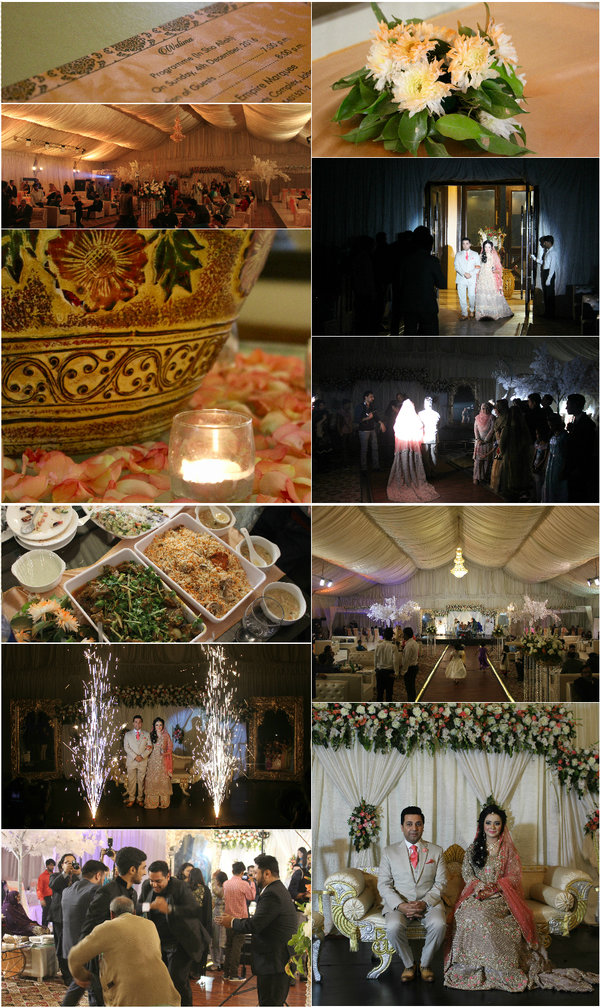
On the third day of the wedding, both the bride’s and groom’s families and friends gather at a wedding or function hall ahead of the couple’s arrival. The bride and groom then arrive, and are announced to the gathering as husband and wife. The walima is therefore equivalent to the Western wedding reception – and there’s food to match. Biryani (a traditional, royal dish) is usually served, along with “Kashmiri green tea” – a mild tea garnished with dried nuts and fruit, again, with undertones of royalty .
There is no exact dress code or colour combination for the walima, but a couple (or their families) usually choose a colour theme. Most guests wear formal Western wear, the groom wears a Western-style suit, and the bride wears a dress of her choice (sometimes reflecting the colour theme of the night). The night closes with music, dancing and dessert – and sometimes (but not essentially) a wedding cake.
Other events (Dholki, Nikkah, Rukhsati)
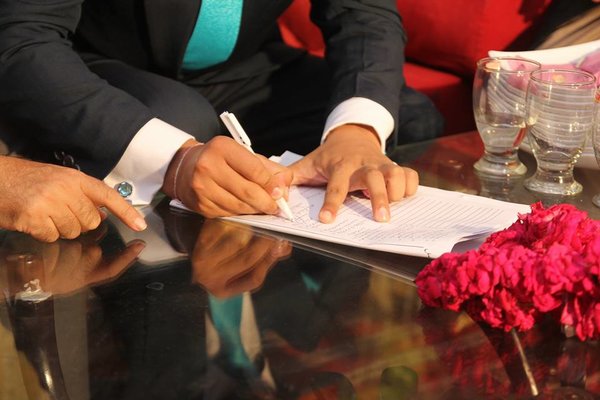
Signing of the nikkah (Islamic marriage contract)
There are several other events that may accompany a Pakistani wedding, or may form the basis of the wedding itself – there are too many to form a complete list here, but three main events may be separated from the above mehndi/baraat/walima program.
Dholki is a party with the groom or bride up to a week or two before the wedding – as the name suggests, it traditionally features the thumping beats of the dhol (traditional drum) and may be hosted by friends or family in honour of the groom or bride. It’s usually an informal affair, held in the family home, with catering by mum. Nowadays a dholki might well feature a YouTube playlist instead of a traditional dhol.
Nikkah, the signing of the marriage contract, is usually done at the baraat, however sometimes it is done without a baraat. If the couple and their families want to keep the wedding low-profile and simple (for any number of reasons), the nikkah may be done at a semi-formal dinner with close family and friends. In this case, there may be no mehndi, baraat or walima, or perhaps just one of them. Orthodox Muslims may also choose to perform only a nikkah, as this is the only requirement set out in the religion – they may consider anything else as “diluting the faith”. Even in the case of a baraat, the nikkah may have been signed in a mosque on an earlier day, to expedite any formalities on the night of the main function.
Rukhsati, the “sending off” of the newly married couple, may be done separately to the nikkah in some cases of arranged marriage. If the simple nikkah is undertaken with the intention to ‘engage’ the other family, a period of courtship would follow, after which the rukhsati would take place. Here, it is a separate, private ceremony where the wife finally joins her husband in his home.
Closing time!
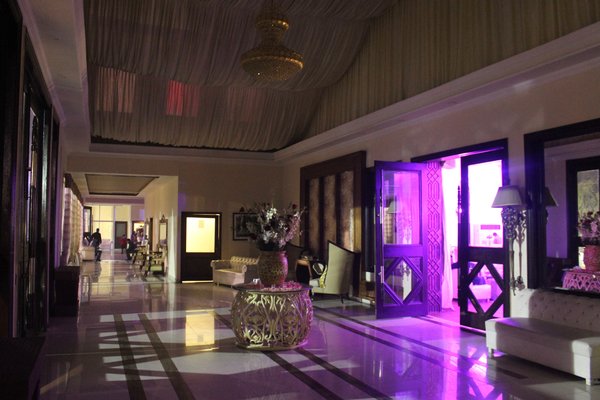
Lights off! It’s closing time at the Empire Marquee!
Punjabi weddings in both India and Pakistan are known for being lavish and exuberant, but weddings have proven too outlandish in Pakistani Punjab where the government imposes strict rules regarding the handling of functions. All wedding halls must close at 10pm sharp – all formalities must be finished by then, and the hall owner quite literally switches off the lights, forcing everyone to vacate, to avoid a hefty fine. Apparently the government, and some sections of society, were getting tired of weddings that would run late, with brides and grooms sometimes arriving at 1 or 2am, and music pumping until dawn, or even later. The rule was imposed about ten years ago, and only applies to wedding halls and function centres, not hotels.
Another curious rule regarding weddings is that hosts in Pakistani Punjab are only allowed to serve one main dish and one dessert at the function. Drinks and salads are exempt. This rule was apparently borne of concern about food wastage, after families felt socially pressured to provide elaborate buffets on each night of the wedding. The high cost of hosting such a dinner, plus the inevitable haul of unfinished food, prompted the government to try to rein in such wasteful weddings.
Many special thanks to my good friends Awais and his wife Sadia and their families for allowing me to photograph their gorgeous nuptials and use the pictures for this piece. Congratulations, and may you have a long, happy and healthy married life 🙂

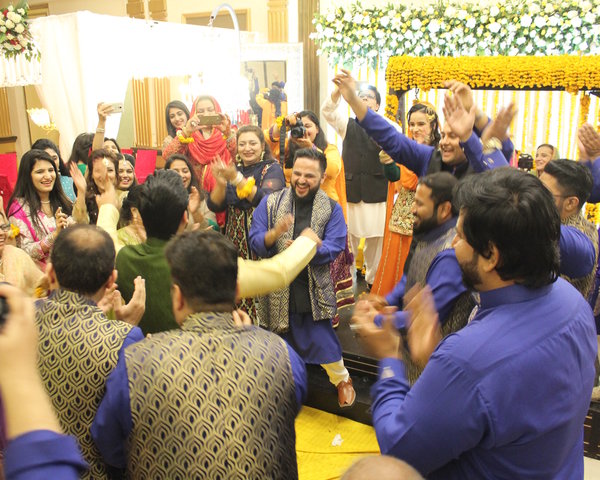
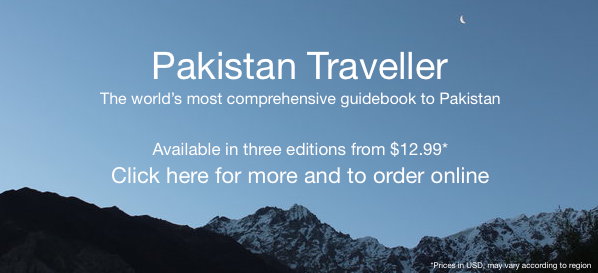
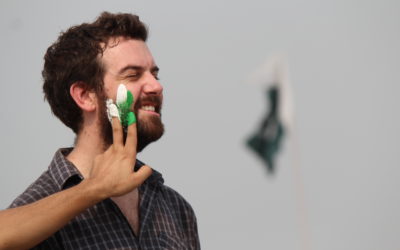
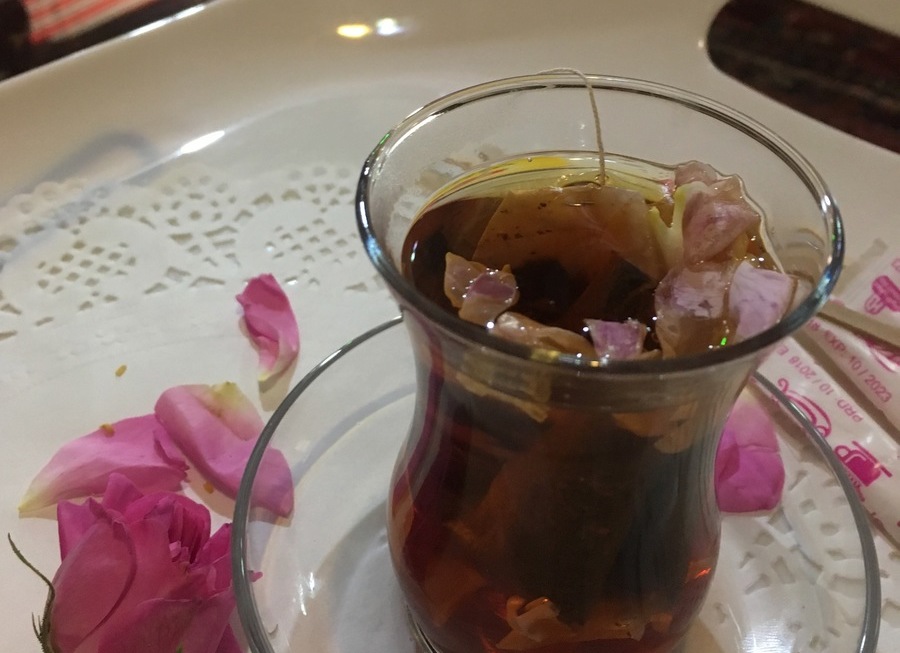

That is such an amazing wedding experience. So different from what I’ve been experiencing in Poland and China. I’m happy you had such an amazing time and all the best for the newly married couple! 🙂
Thanks Agness! I’d love to experience a Chinese or Polish wedding one day too!!
Have I ever told you how much I want to experience an Indian wedding? It’s SO on my bucket list you know….. now I want to add Pakistani wedding to the list. Your right… what a way to experience the culture. As always, amazing pics buddy.
You should so come over here with me one year during “wedding season”!!! And… I’ve done the Indian wedding thing too 😉 jealous? :p
i have always wanted to go to a wedding in the sub continent. still an ambition of mine
Come on over for ‘wedding season’ next year!! :p
Anyone know where in Pakistan lahore I can hire slept for a wedding?
What do you mean by slept?